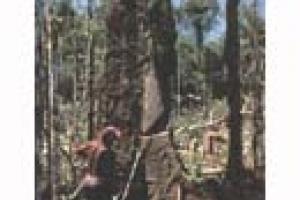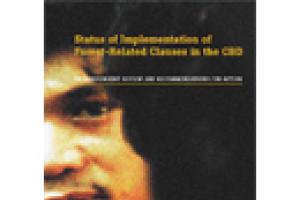The Nukak are a nomadic people from the Colombian Amazon, officially contacted in 1988. The present population is estimated at 390 people, distributed among 13 local groups, located in the inter-fluvial area between the Middle Guaviare and the High Inírida. Nukak as a tongue is understood by the Kakua or Bara from the Colombian Vaupes and both are classified as part of the Maku-Pinave linguistic family.
Colombia
Bulletin articles
29 July 2004
It seems important to learn why for the past few years the issue of forestry in Colombia has been at the hub of the main debates and the government agenda. This article endeavours to reply to this question and to show some political elements that allow us to affirm that the issue of forestry and its environmental services are just another business, not only at national level but also at a global level.
Other information
4 April 2004
The Uitoto peoples in the Araracuara region, in the mid course of the Caqueta River show some common socio-cultural characteristics, among which a production system based on the sustainable use of three spaces: the forest, the river and the “chagra” (a clearing in the forest used for poli-culture plantation).
Bulletin articles
13 December 2003
In 1998, the author Joe Broderick finished his research on the Smurfit Carton de Colombia company, publishing his book “El imperio de cartón: impacto de una multinacional papelera en Colombia” (The Cardboard empire: the impact of a multinational paper company in Colombia). In this book he provides details of the serious social and environmental impacts caused by the activities of a branch of the Irish transnational company, Jefferson Smurfit in that country.
Other information
30 June 2003
During the late seventies Carbocol, a State coal company, revealed the existence of major coal deposits in the Guajira peninsula. The deposits were located in the territory traditionally inhabited by the Wayuu community, an indigenous nomadic people that moved along the region bordering with Venezuela. Following a long controversy on the advisability or not of exploiting this fossil fuel, the State finally gave its authorization to this company under the argument of regional development of energy.
Bulletin articles
3 December 2002
The more that is planted, the more rights that are lost. In Colombia, there are approximately 170,000 hectares of oil palm plantations. Testimonies by a delegate of the palm sector workers' organisation, connected to the Bucarelia and Las Brisas Palm Oil companies, denounce the poor working conditions in the oil palm plantations in the department of Santander, in addition to pressure and incentives to weaken the trade unions in the sector. Oleaginosas Bucarelia has 4,700 hectares and the other company some 2,800, all located at Puerto Wilches, Santander.
Other information
18 July 2002
Only available in Spanish
Publicación de Censat-Agua Viva en ocasión de la Cumbre Mundial de Johannesburgo.
Amazonía: Selva y Bosques diez años después de Río
Bulletin articles
14 June 2002
The semi-intensive production system used in shrimp farms located in the Department of Cordoba, in the Atlantic region of Colombia, has caused great disruption in the surrounding environment. Among other things, this system implies the constant dumping of large volumes of water saturated with organic waste into the estuary of the lower basin of the Sinu river.
Bulletin articles
15 April 2002
In the Planalto forest reserve in Colombia, the 180 species of diurnal butterflies found until today, can go on flying, the ten genuses of Melolonthidae beetle will go on scratching the soil, and also the ants that live there and form part of all the subfamilies in the neotropics will continue their work. The flight of the 160 different species of birds, 9% of the total species identified in Colombia, will continue uninterrupted. All this will be possible thanks to the action of the people living in the reserve area and those who supported their struggle.
Other information
18 March 2002
Commissioned by the Global Forest Coalition
This report is based on 21 country case studies, including Australia, Brazil, Cameroon, Canada, Chile, Colombia, Czech republic, Ghana, India, Indonesia, Kenya,Malaysia, the Netherlands, New Zealand/Aotearoa, Papua New Guinea, Russia, South Africa, Suriname, Uganda, United Kingdom, and Uruguay
Bulletin articles
21 January 2002
On 27 December 2001, the Colombian Inter-Congregational Justice and Peace Commission sent the President of the Republic, Doctor Andrés Pastrana Arango and other national authorities a letter in which, among many other things, it reported that during the first twenty days of December, the “Maderas del Darién” company had been logging in a place known as Mendoza, in the perimeter of San Jose de La Balsa, La Balsa, Bocachica, San Higinio, within the Collective Territory of Cacarica.
Bulletin articles
27 November 2001
For some time now we have been addressing the issue of oil palm plantations. But it was in our June 2001 special bulletin --entirely devoted to the subject-- and in the book "The Bitter Fruit of Oil Palm: dispossession and deforestation", that we entered more specifically into the derivations that this large-scale monoculture has on the situation of the workers.


